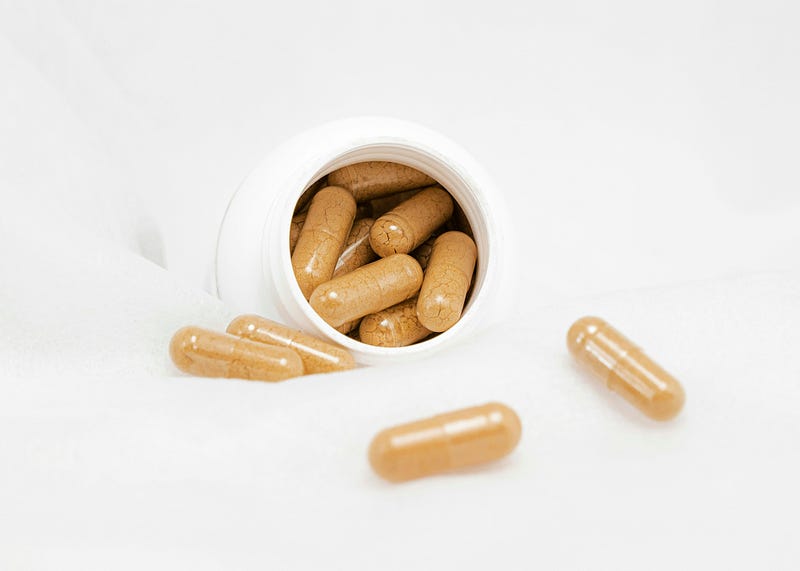The Importance of Daily Probiotics: A Path to Better Health
Written on
Understanding Probiotics and Their Benefits
Incorporating the right blend of probiotics into your daily routine may significantly enhance your overall wellness. This article will explore what probiotics are, their potential benefits, safe usage tips, and more.

Photo by Supliful - Supplements On Demand on Unsplash
Probiotics are widely recognized supplements that primarily aim to boost digestive health, but their benefits extend far beyond that. Including a diverse probiotic supplement with multiple strains in your daily health regimen can offer numerous advantages, as outlined in a study by Shi et al.
Probiotics can aid in managing bowel disorders by enhancing immune responses. They have been linked to lower cholesterol levels, improvements in atopic eczema, skin rejuvenation, wound healing, and strengthening the skin's barrier. Additionally, probiotics inhibit harmful bacteria that cause dental issues and may alleviate conditions like halitosis (bad breath). Moreover, they have shown potential in alleviating symptoms of anxiety and depression by affecting the gut-brain connection, which I will elaborate on shortly.
A high-quality probiotic blend can help restore balance to a disrupted gut microbiome, reduce the brain-gut axis response, support digestion and immunity, and facilitate the production of essential vitamins and amino acids.
What is the Brain-Gut Connection?

Photo by Tim Mossholder on Unsplash
The brain-gut axis, as explained by Grenham et al., refers to the intricate relationship between the enteric nervous system (ENS), which governs the gastrointestinal tract, and the central nervous system (CNS), which includes the brain and spinal cord.
The ENS manages intestinal movements, secretions, and immune functions, sending messages to the CNS via various nerves. Stress responses from the vagus nerve can trigger physical symptoms such as nausea and dizziness. Probiotics may help to balance and regulate these stress responses.
Signals from the brain also influence gut activity, and research suggests that an imbalanced gut can negatively affect mood and behavior. Probiotics are known to promote a healthy gut microbiome and alleviate dysbiosis.
What is Dysbiosis?

Photo by tyrone blight-avery on Unsplash
Dysbiosis refers to an imbalance in the types and quantities of microorganisms in the gut microbiome, which can be linked to various health issues. A well-balanced microbiome is crucial for maintaining overall health, as the microorganisms play vital roles in immunity, digestion, and vitamin production.
An imbalance can lead to dysbiosis, which is associated with several conditions, including diabetes, cancer, obesity, inflammatory bowel disease (IBD), irritable bowel syndrome (IBS), and cardiovascular problems.
Causes of Dysbiosis

Photo by Patrick Fore on Unsplash
Several factors can contribute to dysbiosis, including poor dietary choices, high sugar intake, and antibiotic use. Diets high in sugar can lead to an overgrowth of harmful yeast, while antibiotics may disrupt the balance of beneficial microorganisms. Infections and treatments like chemotherapy can also adversely affect the gut microbiome.
Effects of Dysbiosis on Health
WebMD highlights various mild to severe health issues resulting from dysbiosis, including digestive disturbances, mood disorders, skin conditions, and urinary problems.
Situations Where Probiotics May Not Be Recommended

Photo by Jose Aragones on Unsplash
While probiotics can help restore balance in the microbiome, there are circumstances where their use may not be advisable. Consulting a healthcare professional is essential, especially in cases of severe immunosuppression or existing health conditions. It’s also important to discuss probiotic use before any surgical procedures.
Conflicting Views on Probiotic Efficacy

Photo by Tim Gouw on Unsplash
Despite the known benefits of probiotics, opinions on their efficacy vary. Some experts believe probiotics can aid in treating inflammation, allergies, and digestive issues, while others argue that their impact may not be significant for healthy individuals without any imbalances.
Research indicates that probiotics can be beneficial for vulnerable populations, such as the elderly or very young, and can also help restore gut bacteria after antibiotic treatment.
As such, understanding which probiotic strains are most effective for specific health concerns is crucial. Consulting with a healthcare provider and refining dietary habits can lead to improved health and wellness.
For more information on selecting a quality probiotic blend and understanding CFUs (colony-forming units), please refer to additional resources.
For further insights and product reviews on healthy choices, feel free to explore the linked articles.
Wishing you a path to better health!
Kimberly I
This information is provided for educational purposes only and is not intended to diagnose, treat, or prevent any disease. Always consult a healthcare professional for advice regarding your health.
Sources
This video discusses why daily probiotics are essential for maintaining gut health and overall wellness.
In this video, Dr. Berg explains the seven proven benefits of probiotics and how they can positively impact your health.